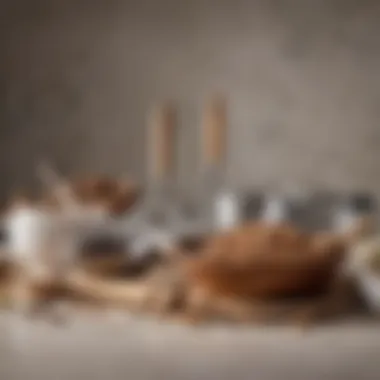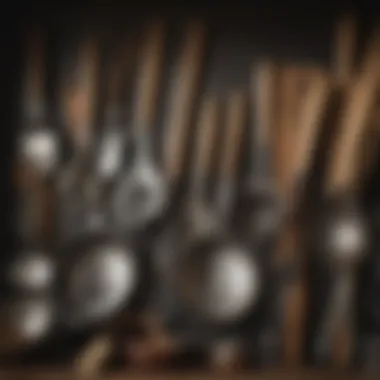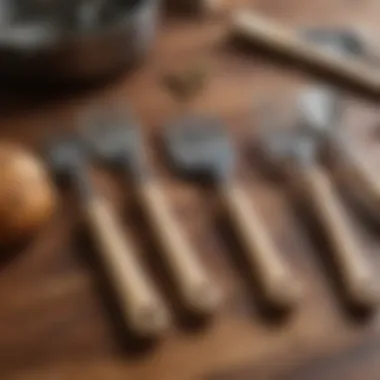Discover Essential Baking Utensils in Your Area


Intro
Baking is a nuanced art where precision and creativity meet. The right utensils can significantly impact the quality of any baked item. Eifther you're a newbie or an experienced baker, understanding the tools you work with is crucial. This section introduces the key ingredients and utensils commonly used in baking, focusing on how to choose them thoughtfully and maintain them for longevity.
Ingredients Breakdown
Primary Ingredients
When it comes to baking, certain ingredients are non-negotiable. Eliminate them and can end up with lackluster results. Common primary ingredients include:
- Flour: All-purpose and cake flour are staples.
- Sugar: Granulated, brown, and powdered for different applications.
- Butter and Fats: Essential for richness and moisture.
- Eggs: Provide structure and act as a binding agent.
- Leavening Agents: Baking soda and baking powder, crucial for rise.
Each ingredient plays a unique role, impacting taste and texture. Understanding that will guide learning in baking.
Optional Ingredients
Optional ingredients can elevate your creations. They add layers of taste and nuances. These may include:
- Spices: Vanilla, cinnamon, and nutmeg to enhance flavor.
- Fruits & Nuts: Raisins, walnuts or chocolate chips provide texture.
- Flavoring Extracts: Such as almond or peppermint can personalize a recipe.
Select wisely. They work for some recipes but can overwhelm others.
Essential Kitchen Tools
A well-equipped kitchen enhances the baking experience. Here are several key utensils needed:
- Mixing Bowl: Choose a size that aligns with your recipes.
- Measuring Cups & Spoons: Accuracy is critical in baking—invest in quality ones.
- Whisk: A versatile tool for mixing ingredients efficiently.
- Spatula: Silicone spatulas work well for scraping pans and mixing.
- Baking Pans: Different shapes and sizes for varied creations, such as loaf, round, and square.
- Cooling Rack: Here are crucial to avoid soggy bottoms in your baked goods.
Having these utensils allows for a smoother baking process. It is important not to underestimate their role.
Understanding the Importance of Baking Utensils
Baking utensils are fundamental for anyone engaging with the culinary arts, particularly in baking. Using the right tools can signficantly enhance both the process and outcome of baked products. Quality utensils provide better performance and durability, reducing the frustration that can come from using inferior instruments. Existing within a vast market, it becomes crucial to understand which utensils can elevate your baking experience.
Choices matter. When choosing the appropriate tools, aspects like design, comfort, and materials all contribute to efficiency and success in the kitchen. Investing in reliable equipment can lead to more consistent results in your baking endeavors.
Moreover, the psychological aspect of working with well-made pots, pans and tools also cannot be underestimated. The motivation that comes from using tools that feel good in your hands can translate into food that not only tastes good but also brings joy as it is shared with others.
Why Quality Matters
Quality of the baking tools directly influences the baking experience. When you utilize measuring spoons that are accurate, mixing bowls that stay put, or pans that distribute heat evenly, the likelihood of perfectly baked treats increases sharply. These details are what differentiate good and bad baking outcomes.
High-quality tools last much longer than cheaper alternatives, saving you money in the long run. Brands like OXO, KitchenAid, or Wilton offer products that are durable and well-designed. The materials used, such as stainless steel or silicone, often resist wear, deliver even heat, and provide versatilty.
Additionally, quality matters in cook safety. Using lower-quality, improperly made tools can pose hazards. For instance, a poorly designed mixer may overheat or flakes might come off pans, ending up in baked food. When selecting tools, it pays to carefully consider their quality.
How Utensils Impact Baking Outcomes
The type and quality of your utensils can dramatically affect the outcome of your baked goods. For instance, the choice between a glass or metal baking pan could change how a cake bakes. Glass retains heat differently than metal, which could lead to uneven baking.


Baking sheets need to be thick enough that they don’t warp under high temperatures but thin enough to allow for proper air circulation.
Furthermore, the calibration of measuring instruments is crucial. If a measuring cup is slightly larger or smaller than what is marked, this will impact the ratio of ingredients in your recipe. Even small discrepancies, whether in measurement or pan choice, can yield baking outcomes from satisfactory to disappointing.
In scrutiny of each element, utensils serve an undeniable role in transformational baking. They cater to various cooking styles, ensuring that tools match the unique needs every baker brings. Thus, focusing on selecting the right baking utensils should not be underestimated.
Types of Essential Baking Utensils
Understanding the variety of baking utensils available is crucial for both novice and seasoned bakers. Selecting the right types of tools can profoundly influence your baking outcomes. Each category of utensils serves a specific function, and having the correct tools allows for greater precision, consistency, and ultimately, satisfaction in results. This section outlines the three main types of utensils every baker should consider.
Mixing and Measuring Tools
Mixing and measuring tools form the backbone of successful baking. Ingredients must be combined in accurate proportions to achieve the desired texture and flavor.
- Mixing Bowls: These come in various sizes and are often made of glass, metal, or plastic.
- Measuring Cups: Accurate measurements are critical in baking. Both dry and wet measuring cups are important.
- Mixing Utensils: Tools like spatulas, whisks, and wooden spoons are essential for effective mixing of ingredients.
These tools enable precision, helping bakers to follow recipes accurately. A slight deviation in measurement can result in drastic changes to your sweet or savory result, going from a delightful baked good to a dense failure.
Baking Sheets and Pans
Baking sheets and pans are the tools that hold your concoction during the magical baking process. They influence how heat is distributed, affecting cooking times and achieving that perfect golden crust.
Some types you may find useful include:
- Cookie Sheets: Perfect for even heat distribution.
- Cake Pans: Varying sizes and shapes like round or square pans for layer cakes.
- Muffin Pans: Ideal for baking individual muffins without the fuss of cutting.
Choosing the right material for pans—such as non-stick, stainless steel, or glass—depends on what you are baking and your personal taste to texture and ease of cleaning.
Specialized Baking Tools
Specialized tools help take your baking skills to the next level and make certain tasks more manageable. While they are not always necessary, they can eliminate disappointments resulting from lack of proper techniques or hurdles. Examples include:
- Sifters: For aerating flour.
- Pastry Blenders: Equip you for mixing butter into flour successfully.
- Baking Molds: Unique shapes for added design on your baked goods.
Investing in these specialized utensils often leads to creative exploration and improvement of good practices in the kitchen.
Finding Baking Utensils Near You
Finding the right baking utensils is essential for both novice and experienced bakers. Having the appropriate tools directly affects not only the comfort of baking but also the quality and success of the finished products. Accessing quality utensils within your locality enhances convenience and allows you to ensure that your investment in baking tools aligns with your cooking style. Knowing where to source materials suitable for your baking pursuits will facilitate your culinary experience.
If you are seeking to refine your baking skills, the following areas will help you locate just the right tools for your needs. Each option has distinct benefits that enhance likelihoods of success in your baking endeavors.
Local Culinary Stores
Local culinary stores often provide a diverse selection of baking utensils. These establishments specialize in kitchen tools and typically carry a range from basic essentials to advanced specialized instruments. When entering such a store, you can expect to find items like mixing bowls, measuring spoons, spatulas, and various types of pans.
When shopping at a local store, there are particular advantages that make it worth your while:
- Personalized Assistance: Knowledgeable staff can offer insights or recommendations based on your requirements.
- Experience Product Quality: Handling utensils can help you assess quality directly, ensuring that what you buy meets your standards.
- Immediate Availability: What you need is usually right there, eliminating wait time often needed with online shopping.
Being local means it is essential to explore these stores first before considering further options, as it cultivates a supportive community of local businesses conducive to culinary growth.


Online Retailers with Local Options
While local shops are excellent for their immediacy, online retailers are increasingly offering local pick-up or delivery options which makes them accessible for many people. Well-known platforms such as Amazon or Walmart provide extensive inventories of baking utensils and tools at competitive prices. Often, they enable users to sort options by location.
Considerations When Choosing Baking Utensils
When it comes to baking, the utensils you select play a crucial role in determining the success of your culinary endeavors. An informed choice in baking utensils ensures not only efficiency in the kitchen but also better quality in the final products. Various elements affect this decision. Assessing the type of material, focusing on durability, and understanding personal baking preferences are essential factors for anyone looking to deepen their baking craft.
Material Selection
Choosing the right material for your baking utensils is vital. Different materials come with their attributes and disadvantages impacting your baking process directly. For instance, stainless steel tools are long-lasting and resistant to rust, making them popular among both amateur and professional bakers. Conversely, silicone utensils are flexible and heat-resistant, also taking off some stress when cleaning. Each material can perform differently based on your particular baking needs.
It’s crucial to consider the heat conductivity, reaction with food, and ease of maintenance when selecting utensils. Certain materials may not react well with specific recipes; for example, aluminum pans can sometimes cause cakes to brown too quickly. Knowing the material allows better decisions in choosing items that align with your baking style.
Durability Concerns
Durability in baking utensils can’t be overlooked. Investing in good quality tools means considering longevity. There is a practical side to durability, as well — if an item breaks during use, it can ruin a culinary project. Identify utensils that withstand everyday uses, such as mixing bowls made from tempered glass or heavyweight non-stick pans that retain their finish after use.
Check for warranties or guarantees offered by manufacturers, as this can denote a product's high quality. Practically, try to find options that may have a bit higher price tag. It is often true, you receive what you pay for. Investing in durable utensils pays off over time.
Suitability for Your Baking Style
Your individual baking style dictates the functionality you need from your tools. Consider the style of baking you enjoy most; is it light pastries, bread making, or elaborate cakes? Determining your main focus helps dictate which utensils are critical. For bread aficionados, a bench scraper might seem essential, while those who craft delicate pastries could prioritize tart pans instead.
Make a checklist of which items correspond specifically to you. Start by crafting a realistic list, reflecting on varioius aspects.
- Types of Meals: Bread requires different utensils compared to cookies or pastries.
- Know Your Preferred Techniques: Mixing vs. folding could determine the need for spatulas or whisks.
- Culinary Goals: If you are aiming to learn new skills in baking or focus on special dietary options, honing your tool collection becomes priority when customizing personal build.
Finding the right utensils can elevate your baking experiences from standard to extraordinary, and understanding your preferences and needs will serve you well in this journey.
Maintaining Your Baking Tools
Maintaining baking tools is crucial for ensuring consistent baking results and maximizing their lifespan. Quality tools, when properly cared for, can last for years, providing enjoyment and function in the kitchen. As an integral part of any baker’s toolkit, the right maintenance practices can make a significant difference in both the ease of use and the final outcomes of your baking efforts.
Proper Cleaning Techniques
One of the pillars of maintaining baking tools is adopting effective cleaning techniques. Each material class, such as silicone, metal, or glass, requires distinct attention to maintain their integrity. Here are some common practices:
- Hand wash: Most utensils last longer when washed by hand. It avoids potential scratches and wear from dishwasher settings. Gentle sponges or cloths work well.
- Avoid abrasive cleaners: Products like steel wool can destroy non-stick finishes and scratch smooth surfaces. Go for non-abrasive cleaning pads instead.
- Use warm soapy water: A mixture of warm water and mild dish soap often suffices to remove most residues. Always rinse thoroughly before drying to prevent streaks or leftover soaps.
Ensure that you have a routine for cleaning any utensils immediately after use when possible. Delaying washing can lead prepared ingredients to dry and become more challenging to remove.
Storage Recommendations
How your utensils are stored also affects their lifespan. Within cluttered spaces, tools can collide, causing scratches or cracks. Here are optimal storage tips:
- Dedicated drawer: Use a drawer lined with a material that provides cushion support to prevent rattling.
- Hanging Bars: For tools that can be suspended, use hooks and hanging bars to keep them accessible while minimizing chances for damage.
- Containers and Bins: Utilizing clear bins can keep smaller utensils organized and easily seen. This ensures that every tool has a designated place and greatly simplifies reaching for them during baking sessions.
By implementing sound storage practices, you will not only ensure your tools stay clean but also you will save time searching for items when the desire to bake strikes.
When to Replace Utensils


Another important aspect of maintaining your baking tools is knowing when to part with them entirely. Observing the materials and functionality for any warning signs can help identify the right moment for replacement:
- Cracks or chips: These may lead to unwanted mixed flavors or further deterioration.
- Signs of severe wear: Utensils lose initial shapes, and coatings may flake over time. When any structural issues are seen or indicated, barring necessity, it’s prudent to replace the faulty tools.
- Changes in results: Lastly, if results from baked goods regress without any alteration in strategy or ingredients, it may be time to conclude that older utensils can no longer meet current baking needs.
Keeping a keen eye on the necessary changes will maintain a consistently high standard in performance and bring joy back into your baking experiences.
Regular maintenance not only preserves your baking tools but also amplifies the pleasure of creating delicious culinary delights. The effort you spend today will yield tastier treats in the long run.
Innovative Approaches to Sourcing Baking Utensils
In the ever-evolving world of baking, sourcing is an essential aspect frequently overlooked by home bakers. As they seek tools to create culinary masterpieces, new avenues arise that extend beyond traditional retail channels. Innovative approaches offer cost-effective solutions, sustainability, and a whole community engagement experience, allowing bakers to enhance their tools arsenal without breaking the bank. Understanding these methods becomes pivotal for anyone keen on refining their culinary skills.
Second-Hand Options
Second-hand baking utensils present numerous advantages. They are typically offered at lower prices compared to new items. This allows bakers to experiment with different tools without a sizable investment. Checking local thrift shops or online platforms like eBay can lead to valuable finds. You may discover lightly used roller pins or unique cookie cutters that someone previously cherished. Look for reputable sellers with positive feedback.
When evaluating these items, ensure they are clean and meet your baking needs. A second-hand Pyrex glass measuring cup, for example, can perform just as well as a new, pricey alternative. Besides cutting costs, this approach promotes sustainability by repurposing items instead of contributing to unnecessary waste.
Community Exchanges
Engaging with the community can open up various options for sourcing utensils. Many areas host swap meets or community events centered around cooking and baking. These gatherings allow individuals to trade excess tools. Participation in such exchanges can broaden friendships and lead to new baking insights, enriching the communal spirit.
Building connections can often yield results. Online forums and social platforms such as Facebook Groups can be useful for bartering and exchanging items. They provide a platform where bakers can announce what items they no longer need and what they seek. It is an excellent way to get high-quality items while keeping your bakering budget in check.
Note: Be open to discovering new baking tools. You may find that items you never considered could significantly impact your baking style.
DIY Baking Tools
Creating culinary tools at home is an intriguing method to approach baking. While many prefer to buy, there are countless tutorials available for making your baking essentials, comprising mixing bowls or pastry brushes, using readily available materials. Making your tools offers a personal touch and can be budget-friendly.
For example, an empty milk carton can become a sturdy scraper, perfect for dough handling. Old fabric can easily become reusable dough bags. The possibilities are vast. Leveraging DIY methods not only saves money but can be highly rewarding. Many feel a deeper connection to their creations when using items made by their hands.
Test new ideas, experiment openly.
Collecting and honing these versatile approaches nullifies restrictions while sourcing essential baking utensils.
Important: Sourcing doesn’t always have to comply strictly with retail. Consider alternatives carefully, and the successful adaptation may surprise you.
Epilogue: Elevating Your Baking Experience
In the world of baking, the right utensils can create a significant difference in the outcome of your culinary ventures. Concluding this guide emphasizes not only the practicalities of sourcing kitchen tools but also the impact of quality on the overall baking experience. Investing in effective baking utensils is about nurturing a deeper relationship with the art of baking. Quality tools often lead to greater precision and consistency, which can transform even the simplest recipes into delightful results. When selected wisely, utensils can enhance baking precision, poly functionality, and ease of clean-up.
The Future of Baking Utensils
As we look to the future, baking utensils continue to evolve. With technological advancements, new materials and designs emerge, pushing conventional tools towards innovation. More brands are focusing on sustainability, offering utensils made from eco-friendly materials that do not compromise performance. Additionally, smart tools equipped with technology lend a modern touch. These tools can give insights into baking temperatures, times, and even assist with recipes through wireless connection, enhancing user experience.
One potential trajectory is the significant role of the internet in educating bakers about tools. Online tutorials coupled with influencer collaborations can inform consumer decisions and provide insight on the best utensils for specific needs. As technology advances, the pursuit of extraordinary baking tools will continue to inspire both amateur and experienced bakers.
Final Thoughts on Investing in Quality
When it comes to your baking equipment, quality should never be an afterthought. Choices often reflect commitment to the craft, and investing in the right baking utensils can pay off in multiple ways. A high-quality whisk or a reliable bake envelope can elevate your efficiency in the kitchen. It reduces baking frustrations caused by equipment failures, ensuring you can focus on creativity. Moreover, quality tools can often stand the test of time, becoming reliable companions throughout your baking journey.
In stark contrast, cheaper alternatives can break, require frequent replacements, and may result in subpar results. A thoughtful consideration of budget is important, but a strong focus on quality can lead to a more satisfying baking experience. As you embark on or continue your baking adventure, give priority to selecting ker utensils that resonate with your style and passion.
Investing in quality baking tools not only enhances culinary precision but also nurtures the overall baking process. Seek balance between functionality and durability without straying far from your personal taste.
Ultimately, honing your baking skills reflects a journey, and your choice of utensils will accompany you at every turn. Incorporating carefully selected tools will not only enhance results but also add joy to the entire act of baking. Taking these factors into account will surely elevate your baking experience for years to come.







